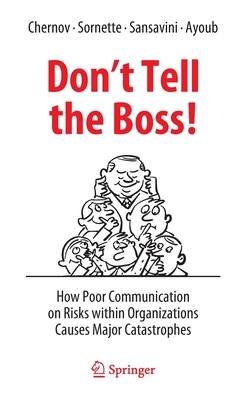After a major disaster, when investigators are piecing together the story of what happened, a striking fact often emerges: before disaster struck, some people in the organization involved were aware of dangerous conditions that had the potential to escalate to a critical level. But for a variety of reasons, this crucial information did not reach decision-makers. So, the organization moved ever closer to catastrophe, effectively unaware of the possible threatdespite the fact that some of its employees could see it coming.
What is the problem with communication about risk in an organization, and why does this problem exist? What stops people in organizations or project teams from freely reporting and discussing critical risks? This book seeks to answer these questions, starting from a deep analysis of 20 disasters where the concealment of risks played a major part.
These case studies are drawn from around the world and span a range of industries: civil nuclear power,coal, oil and gas production, hydropower energy, metals and mining, space exploration, transport, finance, retail manufacturing and even the response of governments to wars, famines and epidemics.
Together, case studies give an insight into why people hesitate to report risksand even when they do, why their superiors often prefer to ignore the news.
The book reviews existing research on the challenges of voice and silence in organizations.
This helps to explain more generally why people dread passing on bad news to othersand why in the workplace they prefer to keep quiet about unpleasant facts or potential risks when they are talking to superiors and colleagues.
The discussion section of the book includes important examples of concealment within the Chinese state hierarchy as well as by leading epidemiologists and governments in the West during the novel coronavirus outbreak in Wuhan in 2019-2020. The full picture of the very early stage of the COVID-19 pandemic remains unclear, and further research is obviously needed to better understand what motivated some municipal, provincial and national officials in China as well as Western counterparts to obfuscate facts in their internal communications about many issues associated with the outbreak.
 Jacket, Women
Jacket, Women
 Woolend Jacket
Woolend Jacket
 Western denim
Western denim
 Mini Dresss
Mini Dresss
 Jacket, Women
Jacket, Women
 Woolend Jacket
Woolend Jacket
 Western denim
Western denim
 Mini Dresss
Mini Dresss
 Jacket, Women
Jacket, Women
 Woolend Jacket
Woolend Jacket
 Western denim
Western denim
 Mini Dresss
Mini Dresss
 Jacket, Women
Jacket, Women
 Woolend Jacket
Woolend Jacket
 Western denim
Western denim
 Mini Dresss
Mini Dresss
 Jacket, Women
Jacket, Women
 Woolend Jacket
Woolend Jacket
 Western denim
Western denim
 Mini Dresss
Mini Dresss














































